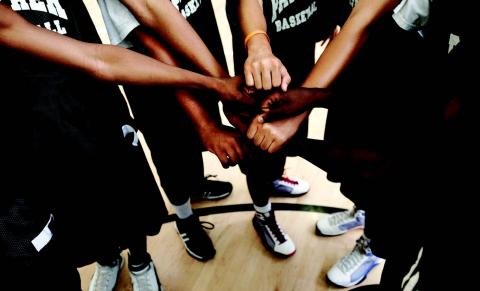Inner City Teenage Mentoring Enrichment Network

Close to 10 on a Friday night, Chris Liang, associate professor of Counseling Psychology, stands before a group of black and Latino kids in a middle-school cafeteria in Allentown, Pa. “We believe in you,” he tells them.
Liang, joined by two Lehigh graduate students, has come to lead a workshop for the Allentown Mentoring Enrichment Network (A.M.E.N.), a midnight basketball program that aims to help inner-city youth stay in school and off the streets, improve their academics and their futures. Liang’s involvement with the non-profit is twofold: to conduct research into the program’s effectiveness and provide the middle-school and high-school students with strategies to succeed.
To help them create a vision for themselves, graduate student Deangie Davis begins an exercise: Imagine waking up in 10 years, she tells them. Everything is perfect. You look in the mirror. Who do you see? Who have you become? What kind of life do you have?
For the next hour, as the youngsters are asked to think about whether they need to go to college to be successful and whether their teachers treat people differently based on their race, Liang offers help in how to talk to school counselors, deal with racism and handle obstacles so that the students don’t get derailed.
“We want them to think about positive future selves,” Liang says later. “A lot of their lives they’re told, Don’t do this. We think that’s important, they need to understand consequences. But if that’s all they’re hearing, it’s not very hopeful. We want to instill a belief in these kids that they can achieve.”
After joining Lehigh’s faculty in 2012, Liang, whose area of research includes the impact of racism on boys of color, was looking for community partners to figure out how to support the boys’ academic and psychological well-being. Through a research team member, he learned about A.M.E.N. and its work in mentoring youth, mostly boys. Liang found a kindred spirit in Pastor Charles Olmeda, the program’s founder.
“One of the things I thought I could do was to help develop a better understanding of what was going on for the kids,” Liang says. "What were their experiences and perceptions of racism, their experiences of their school climate, their conformity to traditional masculine ideologies?”
Though midnight basketball is the program centerpiece—the kids play basketball on Friday nights—workshops that teach life skills, such as how to resolve conflicts, are a key component. Participants cannot play basketball unless they also join in that night’s workshop.
Liang and his research team looked at such issues as masculinity, discrimination, ethnic identity and sense of community. They planned to analyze school data to assess how those variables might be associated with behavioral problems and academic outcomes such as grades and truancy.
Arnold R. Spokane, professor and program director of Counseling Psychology, helped to deliver career interventions: How do they get where they want to go?
Though the research is on-going, Liang says preliminary data show the students are benefiting from the program. They sensed they mattered. Parents reported their children were developing both confidence and relationships, with coaches as mentors.
The more connected the students felt to A.M.E.N., the more motivated they were to do better academically. Whether that motivation correlates to better grades needs more study. Liang is planning to work with the Allentown School District to develop an after-school program to further those goals.